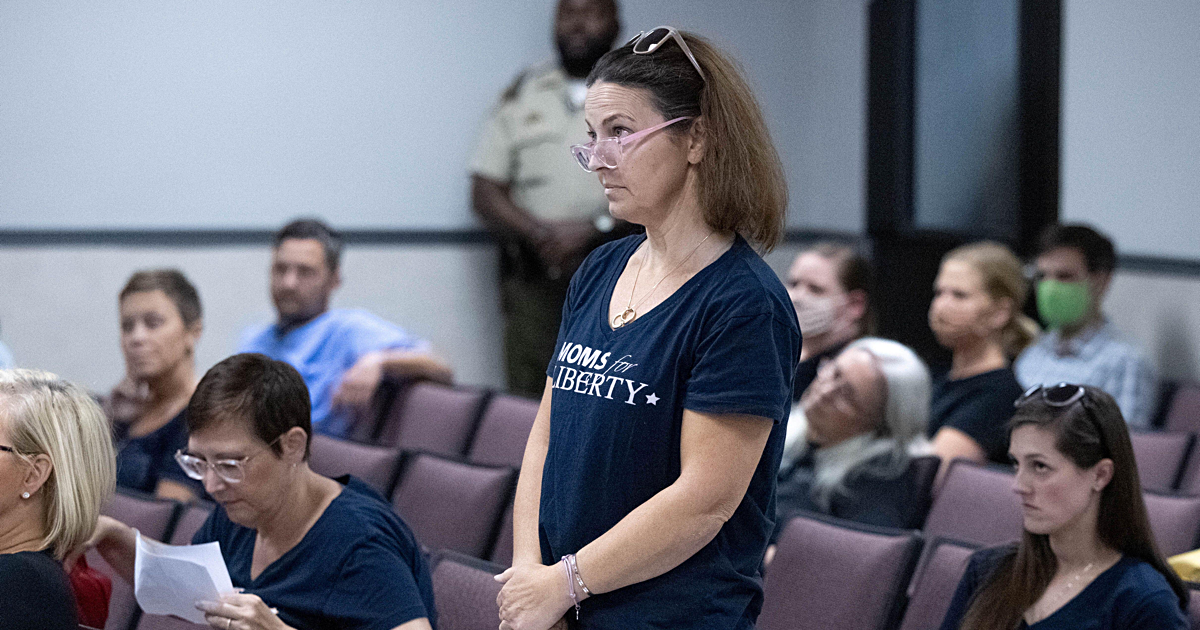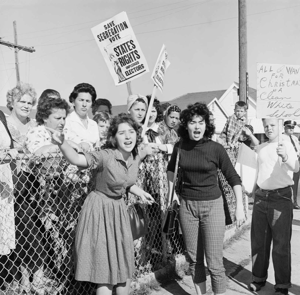Essay

The Roots of Moms for Liberty Run Deeper Than They Think
While many scholars and journalists have focused on progressive feminism as a central, women-driven political movement, a smaller group of historians note that conservative women have succeeded for over half a century by wielding their identities to push a very different agenda.
In a California school district, a group of formidable mothers are raging against a new superintendent, whom they say is working to indoctrinate their children with left-wing ideals about race and gender.
In the name of parental choice, they say, the district should give the superintendent the boot. They attack the superintendent for his global outlook, interest in providing mental health services to students, and his efforts to incorporate inclusive sex education and racial equity initiatives in schools. After months of intense acrimony, the school board heeds their demands and asks him to step down. When he leaves the position, a cloud of unfounded conspiracy theories remain in his wake.
The year isn’t 2022. It's 1950.
Seventy years later, similar battles are waging around the country, as groups of conservative parents—often mothers—and school board leaders attack educators and district leaders who emphasize the importance of racial equity. In February, conservative members of a large Colorado school district pushed a superintendent to resign, in part because of his focus on diversity, equity, and inclusion initiatives. Groups like Moms for Liberty are working relentlessly in some districts to get books about civil rights banned.
Since 2020, thousands of parents have become engaged in new activism centered around frustration with pandemic-era safety policies and what they see as a new overemphasis on race and civil rights in schools, often organizing under the banner of groups like Moms for Liberty.
These groups might be new in name, but historians say they’re born out of clear historical precedent.
These groups are part of a long line of similarly situated organizations, often led by mothers who have wielded their race and gender to help further their aims, sometimes relying on conspiratorial propaganda in the process, historians say.
Such tactics are as old as public education itself.
Tiffany Justice, co-founder of Moms for Liberty, disagrees with these historians’ perspectives, seeing her group as unprecedented—apart from any historical legacy of parental organizing.
“I think COVID gave American parents a real wakeup call … we’re in a time unlike any other we’ve seen in America,” said Justice, a Florida resident with four school-aged children.
And while the group is founded, and named, for mothers, she again sees this emphasis as partly borne out of the current political moment, pointing out that the organization counts fathers and grandparents as members, too.
“Right now in America you have a situation where [education] is really being driven by women because men have been pushed into a position where they’re emasculated.”
. . .
At Moms for Liberty’s first national conference in July, an event that drew over 500 attendees from all over the country, panelists strategized about how to run for office and join school boards. Speakers railed against mental health care services in schools as a way to spread communist ideas to children, reported NBC News.
Such language could have been directly lifted from the 1950s group of Pasadena mothers who worked to oust their local school superintendent under the guise of keeping communism out of schools, says Michelle Nickerson, a professor at Loyola University Chicago and author of "Mothers of Conservatism: Women and the Postwar Right."
Indeed, Justice continued to invoke fears of Marxism. “I don't care if my kids are gay or straight, I accept them no matter what they are in life, I want them to be kind people. I think that’s what most parents want,” she said. “It’s not what these Marxists want.”
Today's battles involve fights around curriculum and racial justice initiatives that discuss the concepts of white supremacy and anti-racism. The Moms for Liberty website describes critical race theory (CRT) as a tenet of “critical social justice,” which encourages students to constantly put the people they meet into boxes based on perceived levels of privilege. The site also says, “They are not trying to win an academic debate, they are attempting to socially replace you.”
“According to Critical Social Justice, straight white people (especially men) are the oppressors, and have systematically rigged society for their own beneft [sic],” says the website.
Nickerson’s book focuses on that group of Pasadena mothers whom she says laid the groundwork for future education battles around the country. She also spent tens of hours interviewing these women who, many years later, lamented their ability to stymie the progress of communism and other progressive social movements.
Still, Nickerson argues that groups of women like the Pasadena moms receive too little credit for the ways they drove social policy behind the scenes.
And while scholars and journalists might focus on feminism as the main political women-driven movement, conservative women have seen enormous success in their ability to wield their identities to demand credibility and push their agendas.
“There is no form of identity politics more effective than that claimed by moms or parents,” Nickerson says. “People don’t pay attention to how effectively they mobilize.”
The Pasadena mothers group of the civil rights era was not only conservative, but also had an explicit segregationist agenda. This group railed against their superintendent for initiatives like holding “intercultural dances” allowing black and white children to mingle.
“They did not want to see themselves as racist but saw anyone who was advocating for civil rights as dangerous,” says Nickerson. They wielded their femininity and the characteristics associated with it to fight against civil rights.
“Conservative women fought desegregation with the belief that their communities were under siege by political elites inciting turmoil that they, as women, needed to repel as housewives – the humblest, most self-sacrificial, and least pretentious members of American society,” writes Nickerson in her book.
When asked, Justice swiftly and forcefully rejected any notion that the group in any way carries on a legacy associated with white supremacy and accused such commentators of naivete about the group and its inner workings.
“Have they come to one of our meetings? Have they spoken to our moms?” asked Justice. “I don’t want to hear from any historian who hasn’t been to a meeting. That’s insulting, and I reject it on behalf of all of the mothers who are part of this organization, who are lovely people and want to see our children united and not divided.”
Nickerson sees both history and innovation at work in the rise of parent-led education activism. Women have always been dominant in education politics at the local level. But when it comes to the battles of today, she hasn’t seen women’s political force in education rise to this level “in some time.”
. . .
Parents on both sides of the political aisle are seizing the moment to mobilize for education.
With three other moms, Paulina Testerman of Sarasota, Florida, started Support Our Schools to fight for the causes that she sees Moms for Liberty as opposing. She’s grown frustrated with the complacency of similar parents who have remained silent in larger fights around curriculum and school board elections.
Of Moms for Liberty, she says, “I wish we were as powerful and [financially] supported as they are.”
Jabari Hosey of Brevard County, Florida, also started a group in his community, called Families for Safe Schools, specifically to act as a counterweight to Moms for Liberty.
He sees language reminiscent of the Pasadena moms group wielded often. In his district, members of Moms for Liberty regularly accuse teachers and administrators of being Marxists, of grooming children, of seeking to indoctrinate. His group, in coalition with others in the area, have effectively fought against some of the Moms for Liberty agenda.
He’s confident, too, that they will have the political force and longevity to sustain their fight, in part because they’re a multiracial coalition that also includes many white women. Whatever political capital Moms for Liberty is able to amass through the use of gender and race is available to his group, too, he says.
“What we look like is truly the community up and down the county,” said Hosey.
. . .
Joseph Jewell, a sociology professor who also heads the department of Black Studies at the University of Illinois, Chicago, has examined the ways women have used their roles as mothers to influence the political sphere, particularly through the lens of education.
Women have historically had only a few public domains in which their authority has been respected, often limited to matters of caregiving. In academia, the ways that women have channeled their perceived authority on these matters to influence public policy is called “social mothering.”
Jewell has studied how white women, in particular, have used their position to maintain society’s racial hierarchy through blocking progress on matters of integration and equitable resource distribution.
White women saw an explosion in influence during the Industrial Revolution, when greater numbers of middle-class women started to work outside the home and to extend their influence in the public domain. At the same time, new waves of immigration began to contribute to native-born white peoples’ narratives about the threats posed by outsiders.
As white women gained more influence during this time, protecting established racial hierarchies became part of their responsibilities as mothers in the public sphere, argues Jewell.
“White professional women were expected to be ‘racial conservators,’ helping to maintain white supremacy by ensuring white children’s ability to reproduce social position,” Jewell wrote in a 2014 paper on the topic.
At the time, feminists touted white women’s’ abilities to maintain these racial boundaries as an argument for increasing their power in the labor force.
“White women’s status as ‘strongholds of racial purity’ made their labor central to maintaining racial dominance in the face of demographic upheaval,” wrote Jewell.
Centuries later, Jewell says this tradition continues. He points to Moms for Liberty as part of this legacy because it has made fighting against the spread of CRT part of its central mission. While CRT is technically a legal framework–pioneered in schools of higher education–that studies American institutions through the lens of race, it is now often used as a catch-all term for all teaching about race in schools, from the innocuous to the extreme. Dozens of laws in states around the country now ban CRT in schools. Such laws can prevent teachers from having the power to educate students on an accurate version of America’s history, like about slavery.
. . .
Moms for Liberty calls itself a parental rights group, designed to stop government overreach and return power to mothers and fathers when it comes to determining what children are taught in school. But Jewell says the group seems specifically designed to only speak for a small subset of mothers–white ones.
“You don’t see very many people of color. Whose moms are these? Whose children are you protecting?” Jewell asked, referring to the group, which boasts 100,000 members across 38 states.
Tiffany Justice, who previously served on her local school board, took offense to Jewell’s suggestion that the group doesn’t work for parents of color. She noted that their members include parents of all races, though they don’t collect demographic data.
Indeed, the group has local chapters around the country and encompasses advocacy around a range of issues, with CRT just one of many. But, as political scientist Jatia Wrighten told the Washington Post after Gov. Glenn Youngkin’s victory last year in Virginia, his push against CRT had “activated white women to vote in a very specific way that they feel like is protecting their children.”
Moms for Liberty has been effective in garnering the attention of high-profile politicians–Florida Gov. Ron DeSantis spoke at their July conference. Their local chapters have employed aggressive tactics in fighting against CRT–a year ago, a New Hampshire chapter offered to pay $500 to anyone who caught a public school teacher violating a new state law that limited teachers from talking about certain types of racism and sexism.
This year, they have scored victories in school board races across the country. With the elections over but votes left to be counted in some states, Moms for Liberty told Newsweek it had won 40 school board seats across Florida and expected to win about 100 more seats on school boards in other states. The group’s membership continues to expand.
They now claim more than 100,000 members in 240 chapters across the country.
Western Carolina University history professor Elizabeth McRae sees their tactics as sharp and dangerous. McRae is the author of “Mothers of Massive Resistance: White Women and the Politics of White Supremacy,” a book about the ways that white women helped maintain white supremacist policies during desegregation.
“The debates around critical race theory are not really about critical race theory, they are about this moment and its quest for racial equality,” says McRae.

Rebecca Klein is a longtime education journalist who has had her work published in outlets like HuffPost, The Hechinger, The Guardian, NPR and more.


